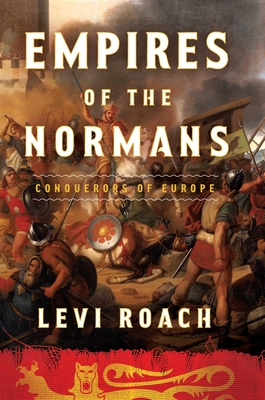 It is dangerous to methodically go through the military history section of Hamilton Books. It is irresistable when coming across some fairly new title drastically marked down. One recent addition from my last order is Levi Roach’s Empires of the Normans. Pegasus Books, August 2022, 301 pages, hardback. Originally priced $29.95, $7.95 at Hamilton Books.
It is dangerous to methodically go through the military history section of Hamilton Books. It is irresistable when coming across some fairly new title drastically marked down. One recent addition from my last order is Levi Roach’s Empires of the Normans. Pegasus Books, August 2022, 301 pages, hardback. Originally priced $29.95, $7.95 at Hamilton Books.
It can be difficult piecing together a coherent history of the Normans. There are books on William and 1066. You get some in books on Irish history, others on the First Crusade. John Julius Norwich wrote a history of the Normans in southern Italy that is long out of print. Roach covers it all.
Chapters:
-
Beginnings: Strange Men from a Strange Land, Normandy, c911-42
-
Consolidating a Colony: Rollo’s Heirs, Normandy, 942-1026
-
Queen Emma, Jewel of the Normans: England, 1002-42
-
Edward the Confessor: A King Across the Sea, England, 1041-66
-
William I: A Conquering King, Normandy and England, 1035-66
-
Court Propaganda: The Case for Conquest, 1066-84
-
The Bayeaux Tapestry: Embroidered History, 1066-97
-
The Fate of the English: Conquest to Colonisation, 1066-1084
-
Church and State in Conquered England: Romancing the Stone, 1066-87
-
Settling the South: Ironarm in Italy, c. 1030-45
-
Robert Guiscard: A Cunning Count, c. 1040-85
-
Under a Byzantine Banner: Into Asia Minor, 1038-77
-
Bohemond and the Balkans: ‘A Marvel to Behold,’ 1081-5
-
The First Crusade: Eastern Promises, 1096-1108
-
A Bridge Too Far? North Africa, 1142-59
-
Northern Wales: A Wolf in Wolf’s Clothing, 1068-98
-
Southern Wales: Making a Mark, 1068-98
-
Iberia: ‘The Race of the Normans Declines No Labour’, 1147-8
-
Scotland: Honoured Guests, 1072-1153
-
The Power Behind the Throne: Scotland Under Ada de Warenne, 1153-78
-
Strongbow in Leinster: Stealing a March, 1167-71
-
Hugh de Lacy: Lord of Meath, 1171-7
-
The End of Empire? John and Normandy, 1204
-
‘Wonder of the World’: Emperor Frederick II, 1198-1250.
Afterlives of the Normans: A Europe Transformed
I generally commemorate the anniversary of the Battle of Clontarf in A.D. 1014 when the Irish and Norse had climactic showdown on April 23rd. It brings out the Cult of Viking Butt Love who don’t like being reminded that Dublin Bay was red with Viking blood. It broke the power of the Jarls of the Islands which the King of Norway took over. The Vatican rang the bells in celebration when news of the Christian victory over the heathen arrived.
The Vikings did not directly change much of Europe outside of the Shetland Islands, Orkney Islands, Faroe Islands, and Iceland. They did indirectly change Europe in Normandy and Kiev when they ceased to be Vikings and integrated with the native populations. Deuce Richardson has said to me more than once that the Normans were the Draka of the Middle Ages. They were an especially vigorous hybrid of Norse and French. A people who were raised to fight (and hunt) and did it better than anyone else for over a century.
I learned some things such as Rollo’s orginal settlement was in the eastern portion in what is now Normandy. The Dukes also received periodic immigrants from Scandinavia all the way up through A.D.1014. No doubt, some Norseman who fought at Clontarf decided Normandy was the safer place.
Richard Toogood who has had guest posts here said to me that the Normans assimiliated themselves out of existence in short order. Roach emphasises that the Scandinavians who became Frenchmen had a habit of losing their identity whether in Ireland, England, Calabria, or Spain. I would imagine the some of the Italian nobility in Apulia, Calabria, and Sicily have Norman origins.
It was great to finally read a history of the brief conquest of North Africa and the adventure of Roussel de Bailleul and his brief lived state centered around Angora in Asia Minor.
At first I thought, I would have liked more on how the Normans fought but Osprey Publications has three books that cover that aspect: Saxon, Viking and Norman; The Normans; and The Normans in Italy. Roach’s book has an elegant concise aspect to it. He covers an incredible amount of history in 300 pages. He brought together a heretofor history than has been covered in pieces rather than a coherent narrative.
April 23, eh? I’m two weeks late but I’ll raise a glass of Bunratty meade in memory of Clontarf and the good men who died there.
Slante.